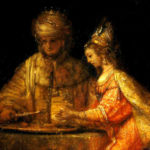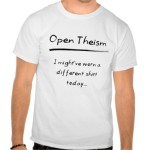We run our website the way we wished the whole internet worked: we provide high quality original content with no ads. We are funded solely by your direct support. Please consider supporting this project.

How Calvinism Misses the Point About Salvation
Calvinists sometimes argue that various passages in John teach that the Father chooses and then “draws” certain people to Christ. Those who are “drawn” certainly come to Christ (John 6:37) while all who are not drawn remain in their sin. For example, John portrays Jesus as repeatedly teaching that “no one can come to me unless the Father has enabled him” (Jn 6:65), while “[a]ll that the Father gives [to Christ]…will come [to Christ]” (Jn 6:37). Those who are the Father’s gift to the Son are “of God”; they are Christ’s “sheep,” and therefore they hear Christ’s voice (John 10:3). Christ chooses them before they choose him (Jn 15:16–19). Others, however, cannot believe because they are not “of God”; they rather belong to the devil (Jn 8:42–47).
In short, such passages are interpreted to teach “particular election” (that is, God chooses to save some and not to save others).
I agree that the Gospel of John emphasizes divine control. Clearly one of John’s central concerns is to highlight the dimension of divine control surrounding the ministry, death, and resurrection of Jesus Christ—including the development of faith in the hearts of those who followed him. The ability to believe and follow the Son is a gift bestowed by the sovereign God, not a work that anyone autonomously produces on their own.
However, along with the rest of the New Testament, John also emphasizes that God’s love is universal. It is God’s love for the entire world that leads him to send Jesus into the world and offer salvation to “whoever” would believe (Jn 3:16). John also clearly states that God’s will is to draw “all people” to Christ (John 12:32–33, cf. 1 John 2:2). Thus, if people refuse to accept this gracious invitation, this is not because the Father excluded them from his love ahead of time. As much as John emphasizes God’s control in the events surrounding the cross, and God’s influence in producing obedient faith in his “sheep,” John never portrays anyone as lacking the power to do other than they do—whether they choose to follow God or the devil! Those who believe are warned not to leave (or be stolen), and those who do not believe are repeatedly invited to do so (Jn 3:16, 18, 36; 7:38; 11:26; 10:9–10).
The question is, how do we reconcile this freedom to follow or not to follow Christ with John’s teaching that faith is a gift of God—viz. that only those whom the Father “draws” can come to Christ?
There are several ways to reconcile these motifs, all of which avoid the conclusion that God has decided from before creation which particular individuals will and will not be saved. These alternative readings, in other words, avoid making God appear arbitrary and duplicitous in saying he loves everyone and seemingly offers salvation to all, while enabling only a few to come to Christ when he could have just as easily enabled all. The Father’s “drawing” (which leads to salvation) and the devil’s stealing (which leads to damnation) are cosmic factors that work in conjunction with, but not in control of, the human volition. In other words, if a human heart is willing to submit, the Father will lead them to a saving faith relationship with Christ. The Father “draws” people (or not) in response to their hearts. If a human heart is unwilling, however, it is hardened to God’s leading and comes under the influence of Satan.
God wants all to be saved and is working in every human heart to get each person to accept the Gospel. But people can and do resist God’s influence and thwart his will for their lives (see e.g. Lk 7:30). When a heart has been successfully opened, however, God goes further and “draws” that person to Jesus Christ.
Image by Just1of7billion via Flickr.
Category: General
Tags: Calvinism, Election, Open Theism, Predestination
Topics: Defending the Open View
Related Reading

Lord Willing? Part 1
Greg sat down with Jessica Kelley recently to talk with her about her book Lord Willing?. We’re posting their conversation in three parts. Today, in part 1, Jessica shares the story of when her son Henry was diagnosed with an aggressive brain tumor at age 4. You can find part 2 of the interview here, and part…

How do you respond to Mark 14:13–15?
In planning for the Passover meal, Jesus tells his disciples, “Go into the city and a man carrying a jar of water will meet you; follow him, and wherever he enters, say to the owner of the house, ‘The Teacher asks, Where is my guest room where I may eat the Passover with my disciples?’…

What is the significance of Esther 4:14?
The wise Mordecai encourages Esther to bravely risk her life by pleading the case of the Jews before King Xerxes, saying, “…if you remain silent at this time, relief and deliverance for the Jews will arise from another place, but you and your father’s family will perish. And who knows but that you have come…

What is the significance of Numbers 14:12–20?
In response to Israel’s bickering the Lord says “I will strike them with pestilence and disinherit them, and I will make of you [Moses] a nation greater and mightier than they” (vs. 12). Moses asks the Lord to forgive the people, and the Lord eventually responds, “I do forgive, just as you have asked” (vs.…

